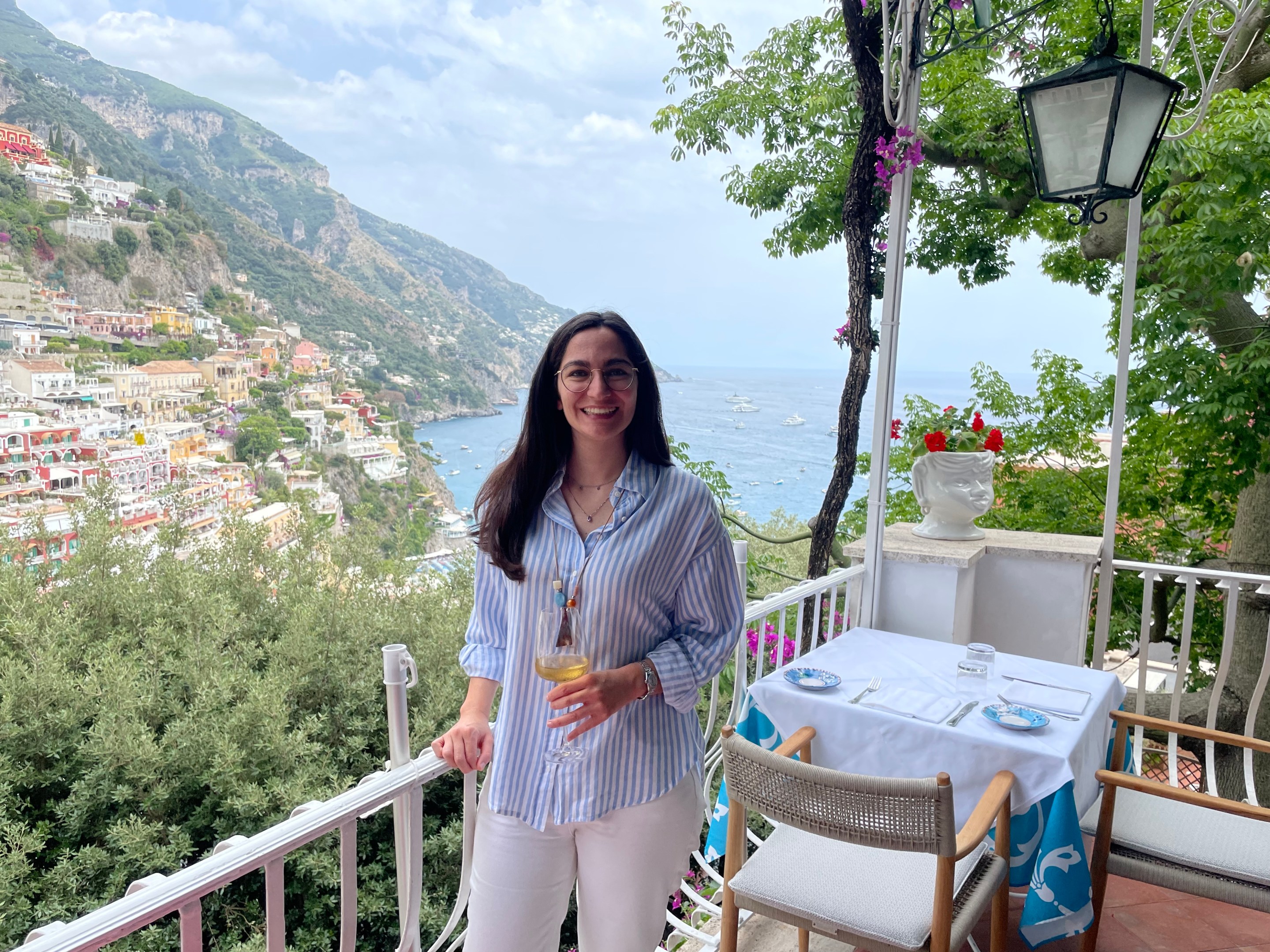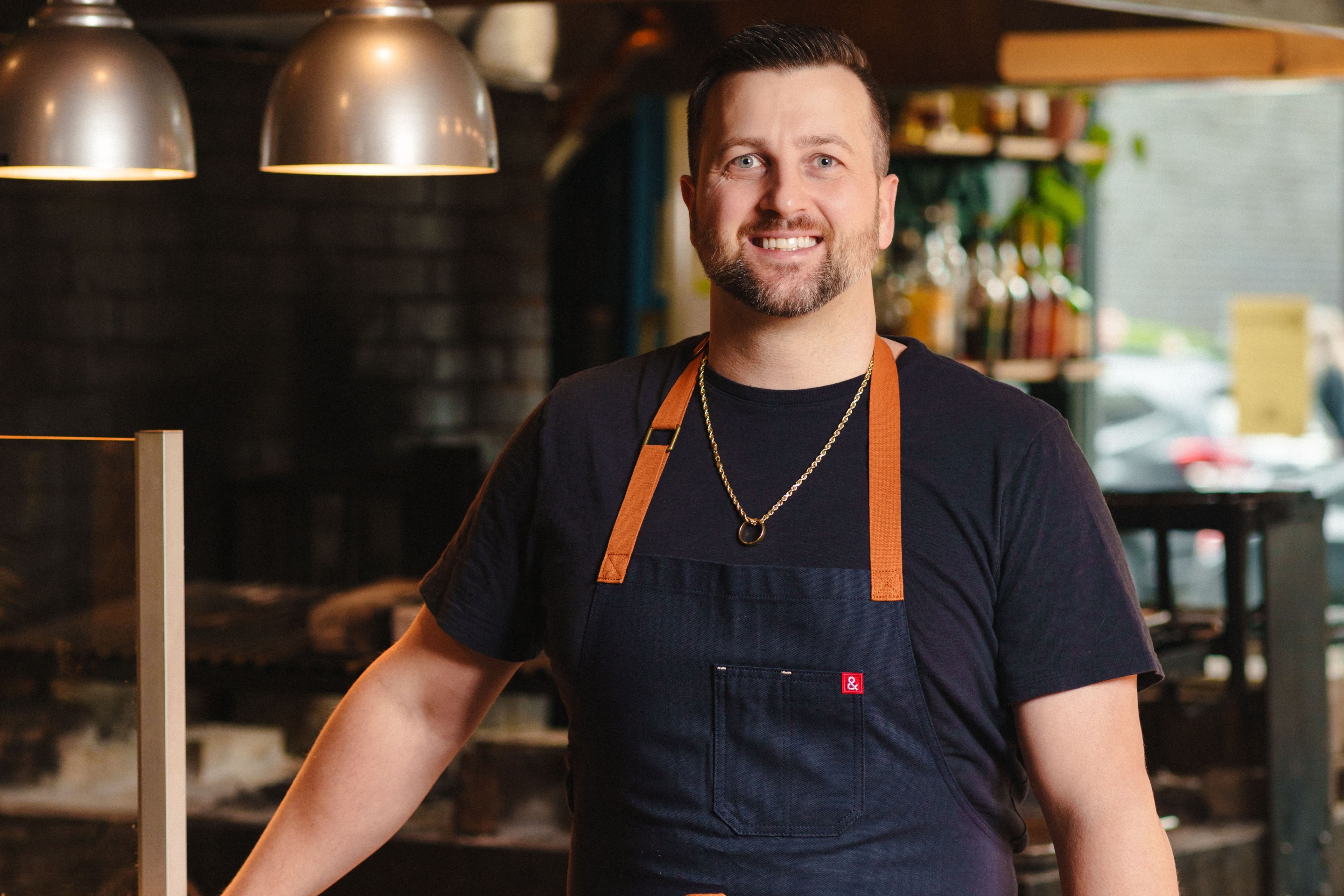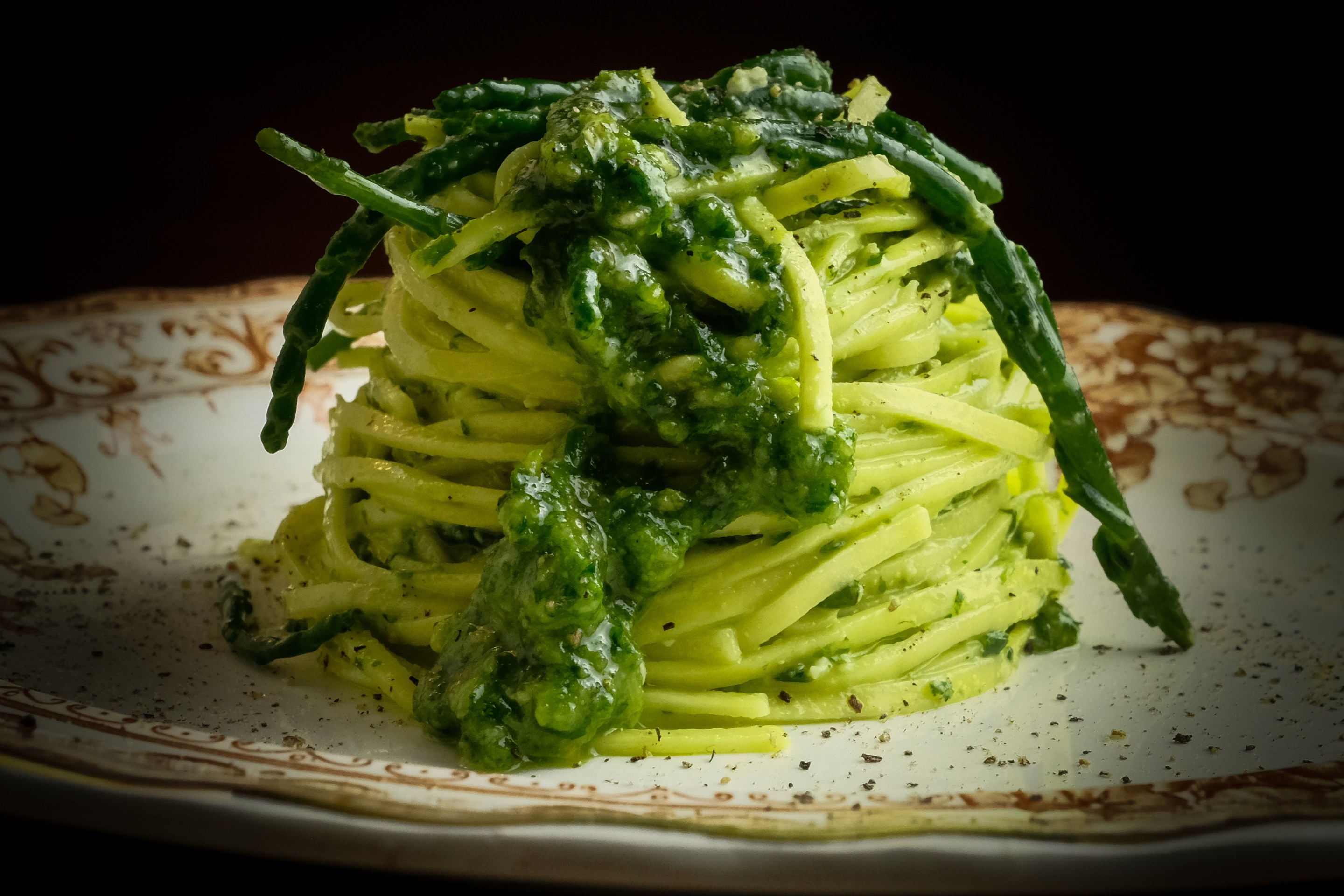Hotel Poseidon is among the most venerable and charming hotels in the town of Positano on Italy’s Amalfi Coast. Founded in 1955 by Bruno and Liliana Aonzo, Hotel Poseidon is now operated by their daughter, Monica Aonzo, and her two daughters, Margherita and Liliana Mascolo. The hotel of 50 rooms and suites offers breathtaking views of the sea and village from the rooms and grand terrace where the pool and acclaimed restaurant, Il Tridente, are located. The interior is spacious with plaster walls and tiled floors; a red carpet cloaks the marble stairs that lead to the breezeway where light-filled, artfully decorated common rooms abound under lofted ceilings. The Hotel Poseidon is among this traveler and writer’s favorite places in the world. I recently sat down with Liliana on the terrace, under a canopy of grape vines and bougainvillea, to talk about the hotel’s history, recent challenges, Il Tridente, and the familial ethos which defines Hotel Poseidon.
Tell us the history of Hotel Poseidon.
It started off as my grandparents’ summer house. They were living in Naples and wanted a small house by the seaside. My grandmother chose Positano, which was not as we see it today. It was a very small town, with a decimated population because most of the people had emigrated to the States after the war. That was the late 40s, and Positano was not a tourist destination. The men who remained were mostly fishermen, and the women were in the clothing business, working with linen. So, my grandmother came, she found the place, and they bought the land after finding the owner of the property in the States. This was not an easy thing to do in the 1940s, locating people who had emigrated to America. Most of them were surprised to find out that somebody was interested in property left behind in Positano. So, my grandparents bought this land. They built their own summer house, which appeared to be already too big for them as they didn't even have kids yet. They decided to rent out rooms during the summertime. Soon they believed that they could run the property as a hotel, and in 1955 they opened it as Hotel Poseidon. They had used money made from the summer rentals to buy land around them, and they kept doing so and expanding the hotel until the late 70s.
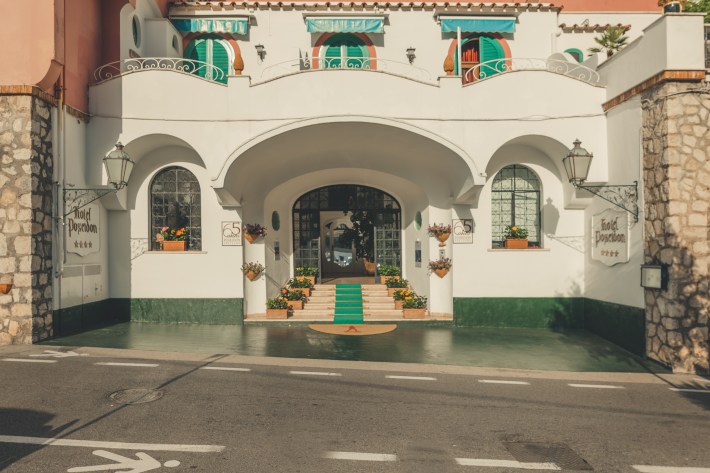
What makes the property physically unique?
The main difference, as compared to the other hotels in town, is that ours is a house. We have 50 rooms, which isn’t a lot in comparison, but they are all very big. As we discussed, it began as a villa, and the expansions stayed true to that design. The terrace has enough space for our outdoor dining as well as the pool and lounge area. The interior is very spacious and open. There are a lot of breezeways and salons. There are living rooms with fireplaces, couches and chairs. All of the furniture and interior design has been arranged by us with an eye towards our personal aesthetic. There's never been an architect in this place. There's never been a designer. And if you like that kind of thing, which is not standard, I think you would enjoy staying here. If you want to find everything perfect and neat and made to purpose, then we're not that. This is what our grandparents made almost 70 years ago, and we're not going to change anything. We've always wanted to keep it as a house because it is. It’s our house, and we live here alongside our guests. That’s the difference.
You grew up in this house, so you've been immersed in the hospitality business your whole life.
Yes. My grandparents started this business before they had children, and our mother, Monica, has lived here her whole life, as have my sister, Margherita, and I. We have all worked in other hotels and lived in different places as young adults, but each of us has grown up here and dedicated our adult lives to Hotel Poseidon.
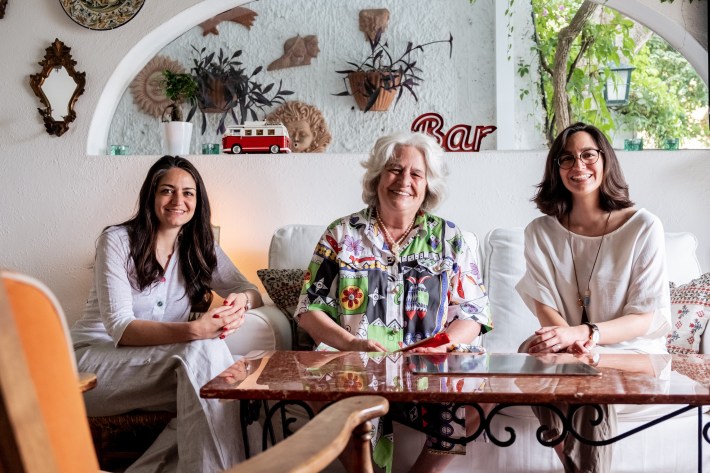
How did you and your family respond to the pandemic?
As far as I remember, Positano has always been busy. In 2019, we reached one of the highest points ever with regard to visitors. So, we prepared for another great season in 2020, which obviously didn't happen because of the pandemic. When everything happened, it was the off season. It was winter. The entire town — hotels and restaurants and everything — were already shut down, so we didn't have the problem that most of the world faced from one day to the next. I think we were lucky in a way that we didn't have to experience that shutdown firsthand. We had time to think, to plan our response if necessary. The very first challenges started for us when we began receiving worried emails from people abroad, as early as January. The lockdown happened here in March. The first Covid case in Italy was, I believe, late February, but we started receiving emails in January, mostly Americans who had heard about something going on and were worried about their holidays. We were not alarmed yet because it was far from us, so it gave us this opportunity to think about what the next steps were going to be and how we would handle the crisis if it arrived.
When the crisis did arrive, how did you handle it?
I believe we did the right thing, which was to talk to people, to hear them out. We had hundreds of phone calls each day with those who had booked their stays at Hotel Poseidon for the summer. We listened to and understood their concerns about traveling. We didn't know what was going to happen, if we were going to be able to reopen for the season at all, but we took the time to hear them out. The seasonal reopening of the hotel was supposed to be at the end of March. That didn't happen, obviously, as Italy was in lockdown then. It was very difficult to plan or to think what was going to happen because no one knew. We were worried, and we were also worried about the staff. If we weren't going to be able to reopen, and provide them their jobs, what were they going to do?
In the end, I remember clearly one day, we decided to cancel all the reservations we had until June. This we believed would relieve a lot of stress for all involved. We sent each guest a personal email basically saying that we understood there is a global crisis in progress and that they are entitled to a full refund or credit. And then we had to do it all over again for an extra month. In the end, we reopened in July of 2020 with zero reservations on the book. Obviously, it was absurd, but we chose to reopen, mainly because we wanted to hire the team again. We hired everyone back. We were the first hotel to reopen in town. We had opened the restaurant in mid-June. We cleared out the space and made tables very far from the others. And then in July, we opened the hotel. We put many precautions in place to prevent spreading of the contamination, and we got the staff back almost entirely. Bringing back the staff as we did helped us throughout the subsequent years because then, as everywhere in the world, there's been a lack of people wanting to work in the service industry. We were very lucky to keep the same staff that we had many years prior to Covid and especially after. They knew that we were all in this challenging situation together.
There's so much to take into account when something unprecedented happens, other than just the guest side. A lot of decisions we made were taken from the heart, and they turned out to be good decisions and smart decisions because we were able to keep the staff, and we were able to have a lot of guests that came back in the years right after the pandemic and still come today. We created a bond because back in 2020 we were the ones answering the phones and answering their emails with empathy, in the most humane possible way, which also involved refunding the money but also taking the time to listen to someone we might not know, from another part of the world, on the other end of the line.
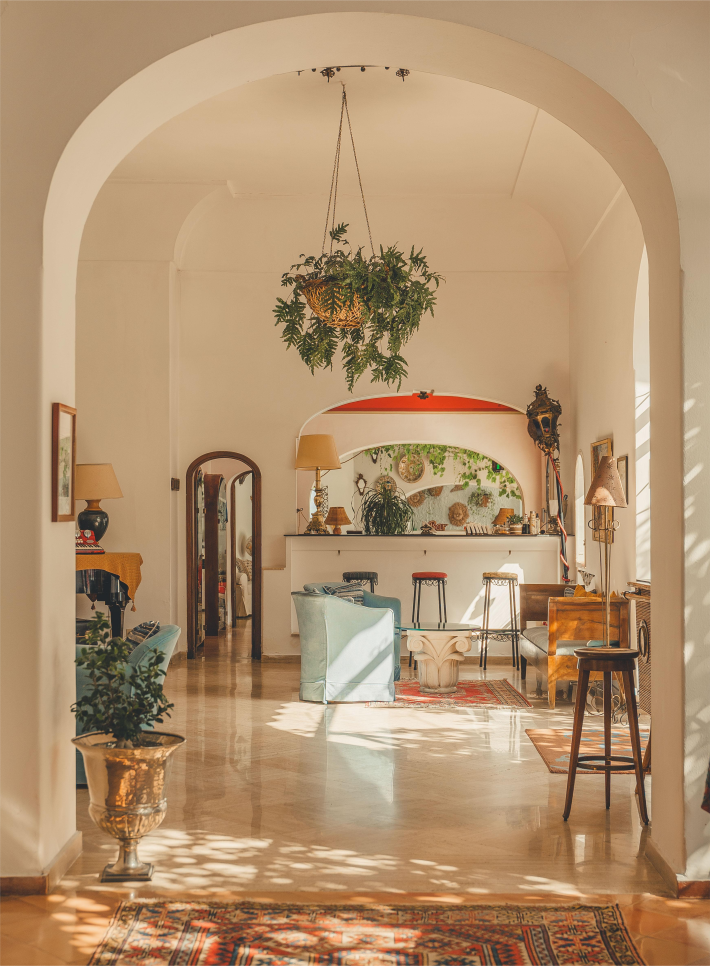
How much of the decision-making process, in all respects, is rooted in the fact that this is a women-owned business?
A lot. Sometimes our decisions might be considered wrong strictly from a business standpoint, but we don't see this as a business. We see this as our home, and we see the guests as people we are happy to open our doors to because they chose to be here. We don’t see our guests or our employees, which in total are nearly 90, as numbers but as humans. It's not always easy because then you have to back up these decisions. Since this is our home first, it’s hard to think in terms of it being a traditional business. This allows us the flexibility to do what we feel is right. We know this is Positano, and we are going to be fully booked for the season. We are going to fill the rooms and the restaurant anyway, but we want to be 100% sure that when you walk in the door, you are greeted and made to feel special, whether you are eating here or sleeping here, or both. We are not interested in statistics. We want you to return, to come back year after year. We have a very high percentage of returning guests, and that makes us very proud to see them again and again. I don’t think this would be possible if we prioritized business over people.
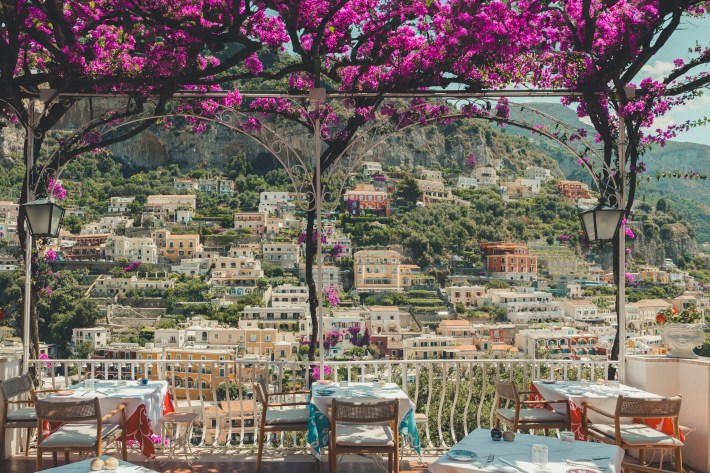
How would you describe the food at Il Tridente?
It's traditional Neapolitan, coastal cuisine but in a contemporary key. We serve breakfast, lunch and dinner. Lunch can be more casual, but dinner is elevated fine dining but also casual and relaxed. Our chef, Antonio Sorrentino, has been with us for ten years, and he pays very close attention to details. Of course, everything is locally sourced, which allows us here on the Amalfi Coast to access the sea, obviously, but also the mountains. The menu is seasonal, though our Branzino, cooked in a crust of salt and wild fennel, always remains on the menu. We have a fish of the day, depending on what’s been caught. We have wonderful pastas, which we make in house, with seafood and an exceptional Pasta Nerano, my personal favorite. We get vegetables, fruits and meats, like veal and lamb, from the farmers in the hills. There’s such a wide abundance here on the Amalfi Coast, and we are happy to feature our local cuisine at Il Tridente in a way that is traditional, sophisticated yet accessible.
Does the food taste better because of this view?
I believe so (laughs).
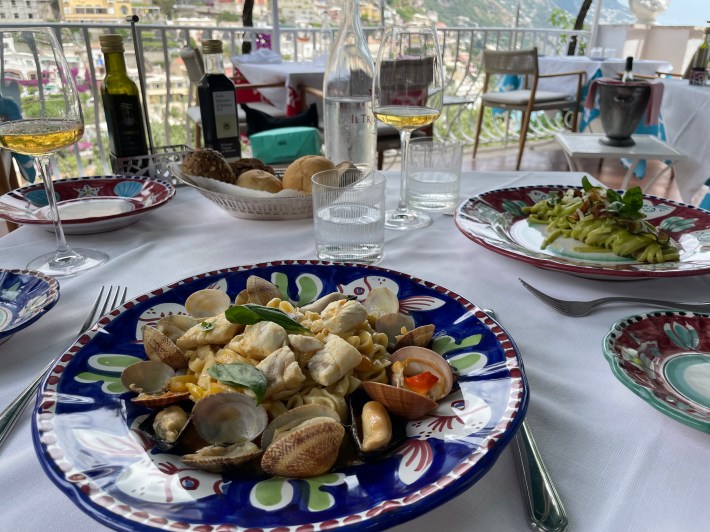
How about the wine list?
Again, we focus on our region because these wines pair best with the local food. Yes, we have a wine list that goes beyond Campania and even Italy, but we encourage pairing local wines with our cuisine. We are particularly supportive of small, local producers since their wines are not exported and are not as well-known as a result, and they pair so beautifully with our food.
Let’s pretend I'm someone who has never been to Positano. Why would I choose Hotel Poseidon?
We've wondered about this a lot. We often ask our guests why they chose to stay with us, and what most people say is that they could see from our presence on social media and through the generous coverage we have received in newspapers and magazines that they love the fact that there is a real family living in the hotel. Because of this, they know that we are going to see each other around a lot. They will see one of us or all of us having lunch outdoors, and then they'll see us behind the desk or helping with the restaurant. That happens to me; that happens to my sister; that happens to my mom. It's the biggest part of what makes us unique because we're 100% in here. If we want to have a meal or a drink, we have to have it here. We don’t have anywhere else to go!
